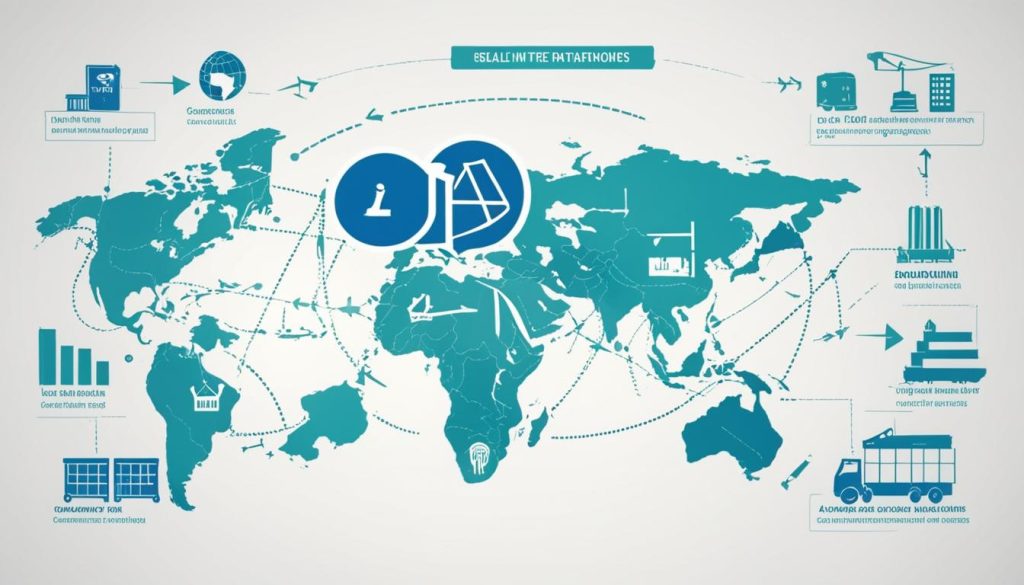The intricacies of international trade have long been pivotal to the economic fabric of nations, weaving a complex tapestry of interdependencies. The advantages and disadvantages of international trade are manifold and multifaceted, influencing myriad aspects of daily life and business on a global scale. Indeed, international trade represents far more than the mere transactional exchange of goods; it symbolises the transnational pursuit of market expansion, alongside the ushering in of competitive pressures that both stimulate efficiency and challenge traditional industries.
While international trade galvanises economic growth and the dispersal of innovative products, it simultaneously exerts pressure on local markets that may struggle to remain buoyant amidst a sea of international competition. This narrative is not merely theoretical; it reflects the tangible reality of trade on a global platform, underscored by nearly $19 trillion exchanged in goods and services as of 2019. Herein lies the true essence of trade – an opportunity for economic expansion shadowed by the challenge of sustaining domestic prosperity.
Key Takeaways
- Exploration of both the benefits and drawbacks inherent in international trade relations.
- Insight into how global trade can lead to economic expansion and the introduction of novel commodities.
- Understanding the competitive pressures placed on small businesses due to international trade.
- A comprehensive view of how trade shapes the economic landscape, from job creation to market challenges.
- Assessment of how international agreements like NAFTA and USMCA illustrate the complexity of trade mechanics.
The Fundamental Role of International Trade in Global Markets
From its embryonic stages in the days of spice routes and silk roads, international trade has burgeoned into a powerful force, sculpting economies and propelling nations into interconnected marketplaces. Beyond mere transactional exchanges, the galvanising effect of global trade dynamics cannot be overstated, with its tendrils reaching into the very fabric of societies and influencing the pulse of business in Germany and businesses operating in Spain.
History and Scale of International Trade
The lineage of trade traces back centuries to a world awakening to the possibilities of exploration and exchange; a period marked by burgeoning curiosity and the expansion of trade routes. Centuries later, the global market’s heartbeat is robust, coursing with an impressive trade volume nearing $19 trillion in 2019 alone. This imposing scale heralds the sheer magnitude and transformative influence of international trade on economies across the globe.
Key Industries Influenced by International Trade
Among the vibrant mosaic of industries propelled by international trade, few stand as prominently as machinery, automotive, and petrochemicals. These sectors serve as the bedrock upon which much of trade’s current prominence is built, enveloping the activities of national heavyweights and moulding the commercial landscapes of Germany and Spain alike. Let us delve into the figures illustrating this impact:
| Industry | Impact on Germany | Impact on Spain |
|---|---|---|
| Machinery & Equipment | Significant exports with a strong global reputation for quality | Notable growth facilitated by international trade agreements |
| Automotive | Home to world-leading brands and a major export driver | A critical sector with expansive production and export numbers |
| Petrochemicals and Oil | Diverse chemical industry with a broad international market | Growing dependency on oil imports, with trade shaping supply security |
Amidst the constant flux of the international marketplace, businesses harness the potential afforded by global trade to not only enhance their economic standing but also to innovate, adapt, and thrive. It’s within this context that the dance of supply and demand plays out, choreographed by the subtle interplay between producers and consumers worldwide. German precision engineering and Spanish automotive prowess stand as testaments to the profound impact of global commerce, each narrating a story of growth influenced by forces beyond their borders.
The narrative of international trade is one of transformation and opportunity, invoking a detailed appreciation for the intricate balance between local initiative and the winds of global economic currents.
Advantages of International Trade
Embracing the global marketplace, firms – particularly those businesses operating in France – and individuals who are living and working in Italy have seen tangible benefits from international trade. This invaluable economic facet paves the way for market expansion while fostering a comprehensive array of products and services.
Access to Broader Markets
One of the pivotal advantages of engaging in international trade is the remarkable opportunity for expansion. French businesses, with their rich tradition and modern innovation, have unfurled their presence across borders, opening up to broader consumer bases and untapped market segments.
Exposure to New Products and Services
Italian artisans and entrepreneurs, by merging cultural heritage with new market opportunities, have encountered an enriching exchange of goods and services through trade. This not only enhances the domestic assortment but also introduces Italian excellence to a global audience.
Economic Growth Through Export Enhancement
The strategy of leveraging exports as a vehicle for economic acceleration is evidently effective. The surge in exports from countries engaging in international trade corresponds with robust growth in their gross domestic product (GDP), evidencing the real potential that export enhancement holds for bolstering national economies.
| Country | Year | Export Contribution to GDP |
|---|---|---|
| United States | 2019 | 11.7% |
| France | 2019 | 31.1% |
| Italy | 2019 | 31.4% |
As the data suggests, the correlation between robust trade frameworks and economic vitality cannot be overstated, with developed nations like the United States, France, and Italy demonstrating significant GDP contributions from exports. It is this economic underpin: the orchestration of international trade that drives forward the narrative of prosperity and expands possibilities for entities across the globe.
Challenges and Disadvantages of International Trade
Whilst international trade has undoubtedly fuelled significant economic development and market expansion, it does not come without notable tribulations, particularly impacting local industries and small businesses. In this section, we delve into how these entities grapple with the competitive pressures from foreign competitors and consider the risky liaison with foreign economies that can shake the foundations of business in the Netherlands and similar countries.
Impact on Local Industries and Small Businesses
The influx of international contenders in the markets has meant that small businesses and local industries often find themselves in a precarious position. Without the resources to scale up or innovate at the same velocity as their international counterparts, many find their market share and long-term sustainability under threat.
Risks of Overdependence on Foreign Economies
Another area of concern is the dependence on foreign markets, which can lead to economic vulnerability. Domestic markets are exposed to global economic downturns and political tides that can recalibrate the entire operational landscape overnight, thus influencing job opportunities and the viability of local enterprises.
| Challenge | Impact on the Netherlands |
|---|---|
| Intense Global Competition | Shrinking market share for local businesses |
| Economic Overdependence | Increased susceptibility to global economic fluctuations |
| Innovation Gap | Hindered ability of small businesses to compete on an international scale |
| Policy Change Sensitivity | Potential instability due to trade policy uncertainty |
It is incumbent upon local governments and industry leaders to address these issues, fostering resilient strategies that not only preserve the integrity of domestic markets but also prop up entities that are the backbone of national economies.
Trading Agreements and Their Role in Shaping Trade Dynamics
The landscape of international commerce is strikingly moulded by formal trade agreements, which serve as the backbone for businesses engaging in cross-border trade. Monitoring changes and understanding the implications of these agreements is crucial for companies, with particular significance for business in Germany and those contemplating starting a business in Portugal.
Examples of Major Trade Agreements
Trade agreements like NAFTA (North American Free Trade Agreement), and its modernised version USMCA (United States–Mexico–Canada Agreement), have set precedents in international trading protocols. These pacts have not only commenced an era of bolstered trade relations among member nations but have also established frameworks that bridge connections for businesses and investors alike.
Shifts in Policy and Their Effects on Trade
However, shifts in trade policy pose certain risks, as seen in recent years with fluctuations in international relations and policy alterations by global powers. A notable instance was the trade unease prompted by the United States in 2018, causing a ripple effect on tariffs and protectionist measures, which redefined market stability and investment decisions on a grand scale.
| Trade Agreement | Influence on Business in Germany | Influence on Starting a Business in Portugal |
|---|---|---|
| NAFTA/USMCA | Promoted export opportunities and legal certainty in transatlantic partnerships | Opened new markets, especially for the tech and automotive industries |
| European Union’s Trade Agreements | Secured reduced tariffs and enhanced competitive positioning within the EU | Facilitated increased import/export activities and regulatory cooperation |
The intertwined nature of such agreements indicates that any change in their constitution is bound to influence the operational dynamics and strategic decisions of businesses around the world. Companies operating within this elaborate matrix must stay alert to the evolution of trade policies, ensure compliance and strategize pentru to secure their position in the ever-competitive market.
Domestic Job Market Impact Through Import and Export Activities
The intricate relationship between international trade and the domestic job market underscores how import and export activities remain pivotal factors for economic growth. On one hand, such trade creates opportunities for diversification and skill expansion; on the other, it leaves room for job outsourcing, presenting a paradoxical impact, notably for businesses operating in Spain. Analysing these outcomes reveals the multifaceted effects trade exerts on employment landscapes.
While export activities are frequently linked to job creation and regional development, they also necessitate a higher calibre of industry-specific expertise, which can affect local employment dynamics. Meanwhile, the importation of goods can lead to a spike in competitive forces within domestic markets, which poses the risk of outsourcing jobs to countries where labour costs are lower.
The following table illustrates how imports and exports have tangibly influenced the job market in Spain, drawing from recent industry-specific data:
| Industry | Effect on Employment from Exports | Effect on Employment from Imports |
|---|---|---|
| Renewable Energy | Increased demand for skilled labour, rise in local job offerings | Adoption of international technologies, higher competitiveness |
| Textiles | Growth in design and manufacturing jobs | Competition with lower-cost markets, potential job outsourcing |
| Automotive | Elevated quality control and precision engineering roles | Pressure to match international standards, possible redundancies |
| Technology Sector | Surge in R&D and innovation-related employment | Introduction of superior foreign products, need for strategic adaptation |
| Agriculture | Enhanced export markets leading to job stability | Import competition threatening traditional farming jobs |
It is evident that while exports are generally beneficial, leading to job creation and bolstering local economies, imports can both enrich and challenge the domestic job market. Industries are thus prompted to innovate and adapt, often outsourcing to maintain competitiveness. Spain, as an exemplar, contends with these realities, balancing between protecting domestic interests and engaging with the global economy.
Future discourse should consider the sustainability of employment in the advent of free trade policies, scrutinising whether the induced job outsourcing aligns with the overarching objective of long-term economic growth. Only then can nations like Spain design strategies that not only embrace the benefits of international trade but also safeguard their workforces against the more adverse effects.
Competitive Advantage in the International Arena
Understanding the intricacies of having a competitive advantage is pivotal for any country aiming to thrive in the global market. Countries like Italy are a testament to the successful application of economic theories, maximising the benefits of living and working in an environment tailored towards international trade. The cornerstone of any competitive nation is its ability to leverage its unique capabilities, giving it a competitive edge that drives trade and fosters economic growth.
What Determines a Country’s Competitive Edge?
Leveraging unique characteristics and strengths forms the basis of a country’s competitive advantage. These aspects signify the capacity for heightened efficiency in producing particular goods or offering services that are inimitably superior or cheaper than international counterparts. For individuals living and working in Italy, such an advantage has come through the synergy of groundbreaking design, exceptional craftsmanship, and the inimitable ‘Made in Italy’ brand.
Comparative vs Absolute Advantage
At the heart of a state’s prowess in international dealings is the distinction between comparative and absolute advantage—one of the fundamental economic theories that govern global trade. A comparative advantage exists when a country can produce a good at a lower opportunity cost than others, while an absolute advantage occurs when a country is the most efficient producer of a good. Italy, for instance, may have a comparative advantage in winemaking, given its climatic conditions and expertise, though not necessarily the absolute advantage in global wine production.
“Specialisation and trade, based on comparative advantage, allow countries to maximise their efficiency and productivity, fostering international business relationships and economic expansion.”
- Economic benefit through increased productivity and trade
- Enhancement of international business collaboration
- Culture and brand perception contributing to competitive advantage
Advantages and Disadvantages of International Trade
International trade is a critical component of the global economy, poised on the intricate balance between the unfettered movement of goods and services across borders and the protectionist tendencies of individual nations. It is a tale of two narratives, where the economic growth resulting from increased market reach stands juxtaposed against concerns of dependency and domestic job displacement.
Economic Theories Supporting International Trade
The underpinnings of international trade rest on classical economic theories, such as comparative advantage, which argue the case for nations to engage in trade that amplifies their production strengths while benefiting from others’ efficiencies. This symbiotic trade relationship often leads to mutual gains, fostering economic growth and innovation, much of which is reflected in the modern intricacies of international commerce.
Criticisms and Potential Negative Outcomes
Yet, international trade is not without critique. Its detractors underscore the disadvantages that manifest as significant threats to local economies. An overemphasis on international markets may lead to neglect of domestic industries, regrettably followed by job losses and economic vulnerabilities. The debate centres on finding equilibrium, where the advantages of trade expansion do not overshadow the foundational needs of a country’s workforce and industry.
| Advantages of International Trade | Disadvantages of International Trade |
|---|---|
| Market expansion | Competition strains on local businesses |
| Diversification of products and services | Job outsourcing |
| Increasing efficiency and innovation | Overreliance on foreign economies |
| Fostering international relationships | Impact on domestic industry development |
| Generating economic growth | Potential for trade imbalances |
In sum, international trade presents a set of both advantages and disadvantages, each exerting influence on national economies and global relations. Acknowledging these facets allows for more informed policies and practises which aim to optimize the benefits while mitigating the detriments associated with extensive international trading networks.
The Interplay Between Consumer Benefits and International Trade
International trade has transformed the landscape of consumer choice, permitting an expanded product selection and encouraging the availability of diverse consumer goods. This global exchange not only fosters competitive pricing but also enriches our lives with products from far-flung corners of the world. Here, we explore the tangible advantages that consumers gain from the intricate web of international commerce.
The ability to purchase goods manufactured across different continents not only embellishes a consumer’s lifestyle with variety but significantly contributes to shaping a vibrant international marketplace. From exotic foods to innovative gadgets, the commodities available to a global audience are limitless.
- Assortment of Fresh Produce – Availability of out-of-season or exotic fruits and vegetables.
- Technological Devices – Access to the latest devices from leading technology hubs.
- Fashion and Apparel – Exposure to international fashion trends and traditional garments from various cultures.
- Speciality Items – Purchase of unique goods that reflect the heritage and specialisation of regions around the world.
The table below provides a snapshot of how international trade has widened the spectrum of purchasable items for the modern-day consumer.
| Product Category | Examples of Goods | Benefits to Consumers |
|---|---|---|
| Fresh Produce | Mangos from India, Avocados from Mexico | Year-round availability, enhanced dietary options |
| Technology | Smartphones from South Korea, Laptops from China | Latest innovations, competitive prices |
| Fashion | Italian leather goods, French haute couture | Diverse styles, access to luxury items |
| Speciality Items | Japanese sake, Belgian chocolates | Cultural authenticity, superior quality |
In conclusion, the synergy between consumer demand and the facilitation of international trade has led to an unprecedented era of choice and accessibility. Global trade agreements and logistical advancements continue to promote the exchange of goods, ensuring that the bounties of the world’s markets are within reach of all those who seek them.
International Trade and Technological Advancement
The nexus between international trade and technological advancement is undisputed, serving as a catalyst for innovation while simultaneously forging robust business ties, particularly in the Netherlands. The diffusion of cutting-edge technologies through cross-border cooperation illustrates a significant element in the puzzle of global progress, allowing nations to cultivate economies that are not only interconnected but also technologically adept.
Impact on Innovation
Innovation thrives on the diverse inflows of knowledge and expertise that international trade bridges between economies. As companies and sectors engage in the exchange of technological knowledge, they stimulate a hotbed of ideas that translates into groundbreaking advancements. For businesses in the Netherlands, this is not merely a chance to expand their horizons but also an opportunity to be at the forefront of innovation.
Technological Exchange Between Nations
Technological exchange represents a key pillar in the architecture of modern international trade. It sets the stage for countries to collaborate and propel industries to new heights, while blending distinct technologies to create novel solutions. With its stable economy and strategic geographic position, the Netherlands becomes a pivotal hub for such transnational technological exchanges.
Technology knows no borders. It is the shared language of progress that drives our global partnership forward.
| Country | Technological Exports | Key Industries |
|---|---|---|
| Netherlands | Advanced Machinery, IT Equipment | Electronics, Renewable Energy |
| Germany | Automobile Tech, Heavy Industry Equipment | Automotive, Engineering |
| Spain | Renewable Energy Components, Agri-tech | Energy, Agriculture |
The dynamic of international trade enables not only the free flow of commodities but also that of ideas and innovations. As we witness an era where technological advancement is paramount, it is inspiring to see how businesses in the Netherlands, along with their global counterparts, are seamlessly integrating into the fabric of progress.
How Tariffs and Trade Policies Affect Global Trading
The intricate web of global trade is significantly affected by the various trade policies that nations implement, most notably tariffs. These fiscal measures have the power to either fortify a nation’s economy by shielding it from external competition or inadvertently instigate trading tensions. In particular, business in Germany, as well as in other industrialised nations, meticulously navigates these policies to maintain a competitive edge while fostering international partnerships.
The Role of Tariffs in Trade
Tariffs are essentially a tool leveraged by governments to control the flow of foreign goods into a country, adding a layer of complexity to international commerce. While they may be seen as a protective barrier for home-grown industries, enabling them to thrive against cheaper imports, the introduction of such trade barriers can also lead to escalated costs for consumers and a potential decrease in the assortment of goods available. This delicate balance prompts constant reassessment of tariff levels to harmonise domestic market stability with the wider scope of global trading interactions.
Protectionism vs Free Trade Concepts
In the ongoing discourse on trade policies, the polemic of free trade versus protectionism underpins many strategic economic decisions. While free trade advocates argue for the elimination of tariffs to foster an open and competitive market environment, proponents of protectionism highlight the necessity of these tariffs to guard burgeoning or vulnerable sectors. Such measures, however, may invite retaliatory actions from trade partners, thereby igniting conflicts that can ripple through the economic landscapes of connected economies. Ultimately, the direction that nations choose influences not just business in Germany, but the larger global economy and its allied trade networks.
FAQ
What are the proven advantages and disadvantages of international trade?
The advantages of international trade lie in market expansion, access to a diverse array of products and services, and the promotion of economic growth through export enhancement. The disadvantages, however, include competitive pressures on local businesses, the risk of job outsourcing, and potential overdependence on foreign economies.
How does international trade play a fundamental role in global markets?
International trade expands global trade dynamics by opening up new markets, boosting business opportunities, and facilitating the transfer and development of technology and expertise across national borders, as observed in countries like Germany and Spain.
How has the history and scale of international trade evolved?
International trade has significantly evolved since the Age of Discovery, growing to nearly $19 trillion in 2019. It historically facilitated the spread of goods, ideas, and cultures around the globe and continues to shape the global market by influencing key industries.
What industries are most influenced by international trade?
Key industries influenced by international trade include machinery, electronics, automobiles, oil, and pharmaceuticals. These sectors experience high trade volumes and are critical for the economic standing of countries engaging in global trade.
Why is access to broader markets beneficial in international trade?
Access to broader markets enables businesses, including those operating in countries like France, to sell their products and services on a global scale, reach new customers, and increase their potential for growth and profitability.
Can international trade introduce new products and services?
Yes, international trade exposes consumers and businesses to new products and services that may not be available domestically, enriching consumer choices and contributing to the exchange of cultural and technological innovations.
What is the impact of international trade on local industries and small businesses?
Locally, trade can create challenges such as increased competition from international firms, which can pressure small businesses and local industries, particularly in countries like the Netherlands, to either adapt and innovate or risk losing market share.
How do shifts in trade policy affect international trade dynamics?
Shifts in trade policy, such as the introduction of new tariffs or changes in trade agreements, can disrupt established trading patterns, impact the cost of doing business internationally, and influence the overall trade environments for countries and businesses, including those starting in Portugal and Germany.
What is the impact of import and export activities on the domestic job market?
Import and export activities can either contribute to job creation and economic growth or lead to job outsourcing. While exports can promote the expansion of job opportunities in certain sectors, increased imports may introduce foreign competition that could potentially displace jobs, as perceived by businesses operating in Spain.
How does a country’s competitive advantage influence its success in international trade?
A country’s competitive advantage determines its ability to produce goods and services more efficiently than other nations. This allows nations to specialise in certain sectors while trading for others, which optimises productivity and can lead to economic gains, benefiting those living and working in Italy and elsewhere.
What is the difference between comparative and absolute advantage?
Comparative advantage refers to a nation’s ability to produce a particular good at a lower opportunity cost compared to others, while absolute advantage exists when a country can produce a good more efficiently in absolute terms. Trade according to comparative advantage can lead to overall greater efficiency and economic benefit.
How do consumers benefit from international trade?
Consumers globally enjoy a wider selection of goods at competitive prices due to international trade. They benefit from products that may not be produced domestically, which increases choice and facilitates the enjoyment of global diversity in consumer goods.
In what ways does international trade foster technological advancement?
International trade fosters technological advancement by encouraging the exchange of ideas and innovations between nations. This dynamic exchange catalyses progress within key industries and leads to rapid technological development that benefits businesses and consumers alike.
How do tariffs and broader trade policies affect international trading dynamics?
Tariffs and trade policies shape international trade by affecting the cost of imports and exports. They can provide protection to domestic industries but may also lead to trade disputes or retaliation. Policies adopted by a country influence its trading relationships and can have far-reaching effects on global commerce.
What is the debate between protectionism and free trade, and how does it affect global trade?
The debate between protectionism and free trade revolves around whether governments should shield their domestic economies from foreign competition through tariffs and quotas or open up markets to free trade. This ideological divide affects international relations, economic policies, and the overall flow of global trade.











